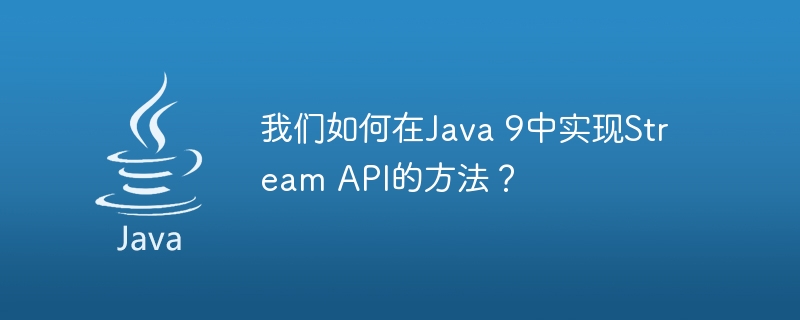 Java
Java
 javaDidacticiel
javaDidacticiel
 Comment pouvons-nous implémenter les méthodes de l'API Stream dans Java 9 ?
Comment pouvons-nous implémenter les méthodes de l'API Stream dans Java 9 ?
Comment pouvons-nous implémenter les méthodes de l'API Stream dans Java 9 ?

StreamAPI fournit de nombreuses fonctions intégrées pour faciliter l'utilisation des pipelines de streaming. L'API est une programmation déclarative, ce qui rend le code plus précis et moins sujet aux erreurs. Dans Java 9, certaines méthodes utiles ont été ajoutées à l'Stream API.
- Stream.iterate() : Cette méthode peut être utilisée comme remplacement de la version streaming de la boucle for traditionnelle.
- Stream.takeWhile() : Cette méthode peut être utilisée dans une boucle while pour prendre la valeur lorsque la condition est remplie.
- Stream.dropWhile() : Cette méthode peut supprimer la valeur dans la boucle while lorsque la condition est remplie.
Dans l'exemple suivant, nous pouvons implémenter des méthodes statiques : iterate(), takeWhile( ), et dropWhile() méthode de Stream API.
Exemple
import java.util.Arrays;
import java.util.Iterator;
import java.util.stream.Collectors;
import java.util.stream.Stream;
public class StreamAPITest {
public static void main(String args[]) {
String[] sortedNames = {"Adithya", "Bharath", "Charan", "Dinesh", "Raja", "Ravi", "Zaheer"};
System.out.println("[Traditional for loop] Indexes of names starting with R = ");
for(int i = 0; i < sortedNames.length; i++) {
if(sortedNames[i].<strong>startsWith</strong>("R")) {
System.out.println(i);
}
}
System.out.println("[Stream.iterate] Indexes of names starting with R = ");
<strong>Stream.iterate</strong>(0, i -> i < sortedNames.length, i -> ++i).<strong>filter</strong>(i -> sortedNames[i].startsWith("R")).<strong>forEach</strong>(System.out::println);
String namesAtoC = <strong>Arrays.stream</strong>(sortedNames).<strong>takeWhile</strong>(n -> n.<strong>charAt</strong>(0) <= 'C')
.<strong>collect</strong>(Collectors.joining(","));
String namesDtoZ = <strong>Arrays.stream</strong>(sortedNames).<strong>dropWhile</strong>(n -> n.charAt(0) <= 'C')
.<strong>collect</strong>(Collectors.joining(","));
System.out.println("Names A to C = " + namesAtoC);
System.out.println("Names D to Z = " + namesDtoZ);
}
}Sortie
<strong>[Traditional for loop] Indexes of names starting with R = 4 5 [Stream.iterate] Indexes of names starting with R = 4 5 Names A to C = Adithya,Bharath,Charan Names D to Z = Dinesh,Raja,Ravi,Zaheer</strong>
Ce qui précède est le contenu détaillé de. pour plus d'informations, suivez d'autres articles connexes sur le site Web de PHP en chinois!

Outils d'IA chauds

Undresser.AI Undress
Application basée sur l'IA pour créer des photos de nu réalistes

AI Clothes Remover
Outil d'IA en ligne pour supprimer les vêtements des photos.

Undress AI Tool
Images de déshabillage gratuites

Clothoff.io
Dissolvant de vêtements AI

AI Hentai Generator
Générez AI Hentai gratuitement.

Article chaud

Outils chauds

Bloc-notes++7.3.1
Éditeur de code facile à utiliser et gratuit

SublimeText3 version chinoise
Version chinoise, très simple à utiliser

Envoyer Studio 13.0.1
Puissant environnement de développement intégré PHP

Dreamweaver CS6
Outils de développement Web visuel

SublimeText3 version Mac
Logiciel d'édition de code au niveau de Dieu (SublimeText3)
 Comment fonctionne le mécanisme de chargement de classe de Java, y compris différents chargeurs de classe et leurs modèles de délégation?
Mar 17, 2025 pm 05:35 PM
Comment fonctionne le mécanisme de chargement de classe de Java, y compris différents chargeurs de classe et leurs modèles de délégation?
Mar 17, 2025 pm 05:35 PM
Le chargement de classe de Java implique le chargement, la liaison et l'initialisation des classes à l'aide d'un système hiérarchique avec Bootstrap, Extension et Application Classloaders. Le modèle de délégation parent garantit que les classes de base sont chargées en premier, affectant la classe de classe personnalisée LOA
 Comment implémenter la mise en cache à plusieurs niveaux dans les applications Java à l'aide de bibliothèques comme la caféine ou le cache de goyave?
Mar 17, 2025 pm 05:44 PM
Comment implémenter la mise en cache à plusieurs niveaux dans les applications Java à l'aide de bibliothèques comme la caféine ou le cache de goyave?
Mar 17, 2025 pm 05:44 PM
L'article examine la mise en œuvre de la mise en cache à plusieurs niveaux en Java à l'aide de la caféine et du cache de goyave pour améliorer les performances de l'application. Il couvre les avantages de configuration, d'intégration et de performance, ainsi que la gestion de la politique de configuration et d'expulsion le meilleur PRA
 Comment puis-je utiliser JPA (Java Persistance API) pour la cartographie relationnelle des objets avec des fonctionnalités avancées comme la mise en cache et le chargement paresseux?
Mar 17, 2025 pm 05:43 PM
Comment puis-je utiliser JPA (Java Persistance API) pour la cartographie relationnelle des objets avec des fonctionnalités avancées comme la mise en cache et le chargement paresseux?
Mar 17, 2025 pm 05:43 PM
L'article discute de l'utilisation de JPA pour la cartographie relationnelle des objets avec des fonctionnalités avancées comme la mise en cache et le chargement paresseux. Il couvre la configuration, la cartographie des entités et les meilleures pratiques pour optimiser les performances tout en mettant en évidence les pièges potentiels. [159 caractères]
 Comment utiliser Maven ou Gradle pour la gestion avancée de projet Java, la création d'automatisation et la résolution de dépendance?
Mar 17, 2025 pm 05:46 PM
Comment utiliser Maven ou Gradle pour la gestion avancée de projet Java, la création d'automatisation et la résolution de dépendance?
Mar 17, 2025 pm 05:46 PM
L'article discute de l'utilisation de Maven et Gradle pour la gestion de projet Java, la construction de l'automatisation et la résolution de dépendance, en comparant leurs approches et leurs stratégies d'optimisation.






